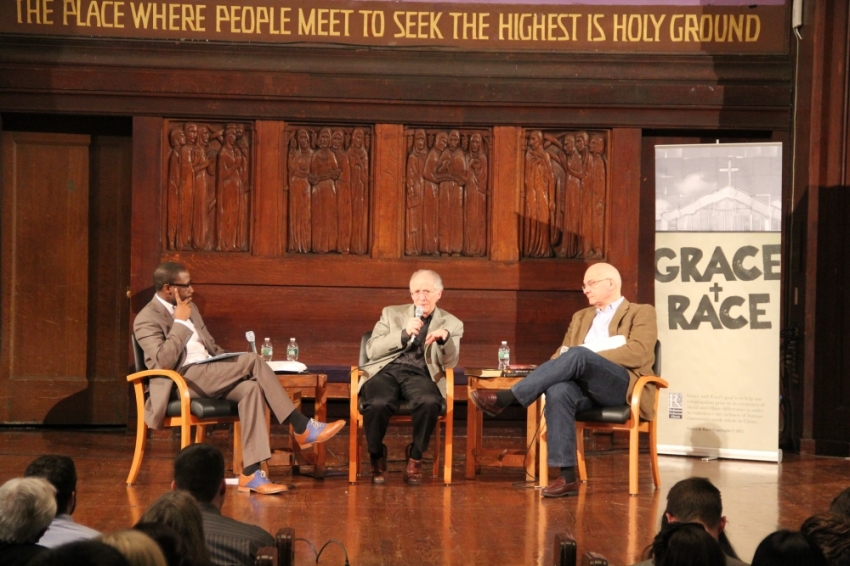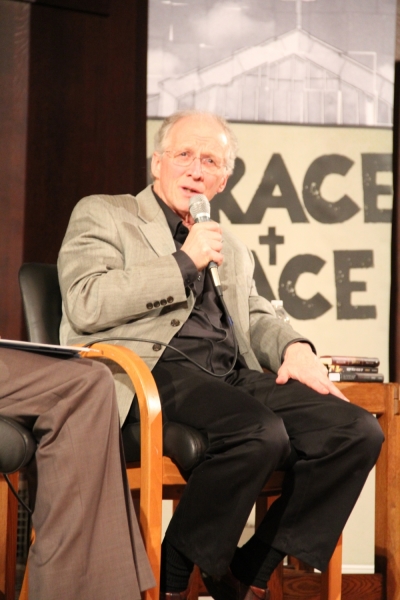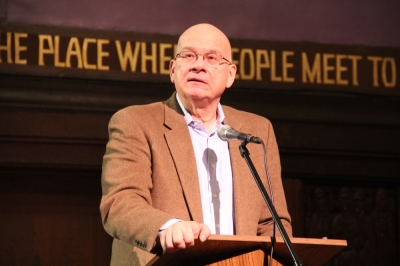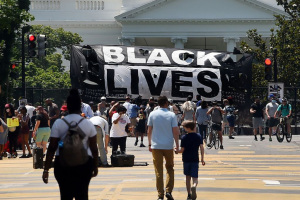John Piper, Tim Keller Discuss Why Churches Still Struggle With Racism

[Editor's Note 3/31/2012: An earlier version of this story neglected to include the remarks by moderator Dr. Anthony Bradley. The revised version includes his remarks. The Christian Post regrets the confusion and misunderstandings that were generated by the first version of the article.]
NEW YORK – At a live discussion on race and the Gospel this week in New York City, evangelical pastors John Piper and Tim Keller discussed why racism still persists in today's Church and shared struggles that pastors, including themselves, face in pursuing racial diversity in their churches.
Piper, pastor of Bethlehem Baptist Church in Minneapolis, Minn., and Keller, pastor of Redeemer Church in New York City, headlined a conversation called "Race and the Christian," held Wednesday at the New York Society for Ethical Culture. Dr. Anthony Bradley, Professor of Theology at The King's College in New York City moderated the talk. Piper's latest book Bloodlines: Race, Cross, and the Christian was the impetus for the event.
Grace Over Race
In his talk, Piper characterized racism as a "history-long, global problem" that could only be explained by the biblical narrative of sin and the Fall. Man's sin of pride, according to Piper, causes him to find satisfaction in himself rather than in God, providing the basis for racism.

"That is because humans are in rebellion against God. That's where that comes from. Exalting ourselves over our maker and of course, if over our maker, over each other. That's a given," Piper told the audience at the New York Society for Ethical Culture.
The Christian worldview that culminates in the Gospel undermines racism, he continued.
"You are so sinful and I am so sinful we are roped together. There is no exalting of another over another here. We are both dead, bent rebels together on our way to hell. How vain is the exaltation of a sinner over another sinner?" Piper said.
Christ died to reconcile us all in one body, said the Bloodlines author. Those who have received this redemption through faith must base his identity on the grace of Christ, not race, he said.
So why is there still racism in today's church? Piper believes Christians can do better but they must intentionally choose grace over race.
"Redemption is not perfection," said Piper. "The redeemed must realize their imperfections."
Racism as a Systemic Evil
Keller, who wrote the foreword to Bloodlines, argued that racism is perpetuated by "systemic evil" and the lack of "corporate responsibility." Racism persists, he contended, because the system that allows it to exist is actively or passively supported to varying degrees by different participants.
For example, the Holocaust happened because a whole system was working, according to Keller. At the top of the system, there were people who sent Jews to death camps but at the bottom, there were German citizens who heard rumors, didn't want to know more and continued to pay taxes.

Like Piper, Keller agreed that converting people to Christianity is not enough to combat racism. "You can't just convert everyone and convict them of their individual sin of racism," he said.
Keller said the system must change in order for the people to change. But one of the challenges, he presented, is that "white people" don't have a concept of "corporate responsibility" which prevents them from dealing with "corporate evil" or "systemic racism."
The Bible supports the practice of corporate responsibility, Keller further explained. In Joshua 7, corporate responsibility in family is illustrated when Akin and his family are punished for Akin's sin of taking the wealth for himself. Daniel 9 demonstrates corporate responsibility for an entire culture because it shows how the prophet Daniel repents for the sins of his ancestors and sins that he individually didn't commit.
This lack of understanding can explain why many white Americans couldn't understand "Linsanity," joked Keller. If they had truly grasped the principle of corporate responsibility, they would have understood that for other cultures it's both the "guilt" and the "credit" that is applied to a whole community.
Keller underscored the need for Christians to see systemic evil, take responsibility, and come alongside those who recognize systemic evil to articulate their concerns.
Love Instead of Rhetoric
Bradley, who moderated Wednesday's discussion, shared his perspective as an African-American who grew up after the civil rights movement but grew up listening to his parents tell brutal stories about how they were treated like animals in the Jim Crow South.
He thanked Piper for confessing his sin of racism in Bloodlines and said there needed to be more people in this generation to confess where they have failed when it comes to the issue of racism.
According to Bradley, the discussion of racism needs to be framed around God's covenant story and Jesus' teachings of love if it is to move beyond just rhetoric. It is not enough, for example, to be for abolition but not embrace Jesus' teaching of "love thy neighbor."
Bradley's parents were told by white Christians proselytizing that they were saved by grace but were never told that they were worthy of being loved by them.
"We need to go much, much deeper," Bradley challenged the audience and those tuning in to the talk via livstream. "Much of the credibility of what is said here is based on what you all do in the next five or ten years."
Changes that would reflect "progress," according to the King's College professor, would include evangelicals listening to the perspective of more black or brown theologians or the presence of more black speakers at a Gospel conference, instead of typically being outnumbered by white speakers 20 to 1.
"If your churches continue to look the same way they look now, the leadership in your organizations don't change, people will be suspicious that this is simply rhetoric," said Bradley.
He called on Christians to participate in God's mission of "reconciling all things" and make the world they live in reflect His glory and mission.
Challenges in Creating a Racially Diverse Church
During the two-hour long discussion, Piper and Keller also shared challenges they encountered in promoting racial diversity in their congregations.
Piper, who pastors a predominantly White church, said he was criticized for writing a book on racism when he couldn't make his own church racially diverse. He frankly admitted his shortcoming Wednesday, saying he is "an urban pastor who doesn't have an ideal church."
"I'm 65. It isn't going to get better in my church under me. It's over," he added. Piper announced earlier this week that he is preparing to step down as lead pastor of Bethlehem Baptist Church.
Though it may be difficult to achieve racial harmony, Piper encouraged Christians to at least try even if they end up making mistakes along the way. His church once attempted ethnic worship but it proved to be a disaster. Still, some of his non-white church members thanked him for the effort.
"That you care and that you tried matters a lot," said Piper. "Give yourself to people who are different from you and give yourself to the Word."
Keller, whose congregation is comprised of over 50 percent Asian, said that the race of the pastor also presents a challenge in retaining a multi-ethnic congregation. For example, it is harder for an Asian or Hispanic pastor to retain Whites because Whites naturally assume that the congregation is Asian or Hispanic since they are not used to a non-white person being in power. On the other hand, a white pastor can more easily retain a non-White member because non-Whites are used to white people being in charge.
He said he learned that criticism comes with the territory of such a controversial issue like racism. Any pastor who wants to diversify his church is bound to "fall short" and "be told you're falling short," said the Redeemer pastor.
But Keller takes everything with a grain of salt, telling himself, "I'm not going to feel sorry for myself because that is a very white thing to do."
"Race and the Christian" was sponsored by Crossway and hosted by Redeemer's Grace and Race Team.
READ A BLACK FEMALE CONGREGANT'S PLEA TO HER PASTOR FOR CHURCH DIVERSITY



























